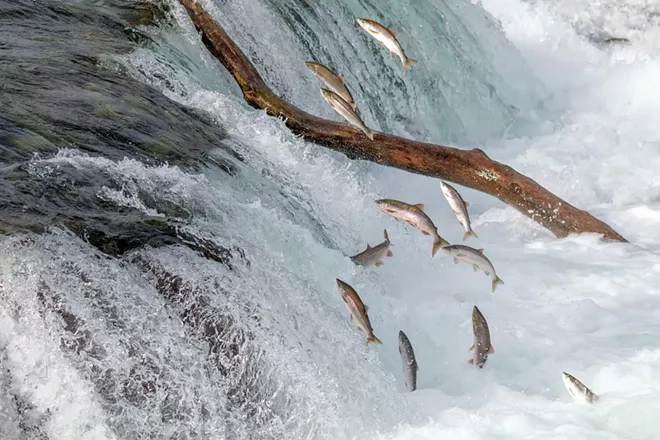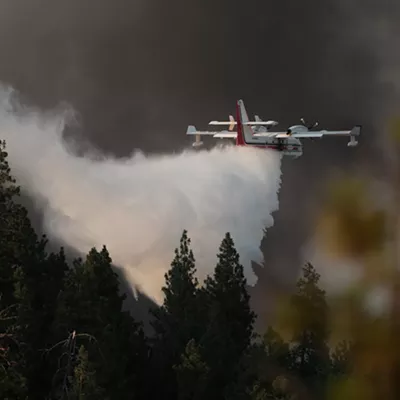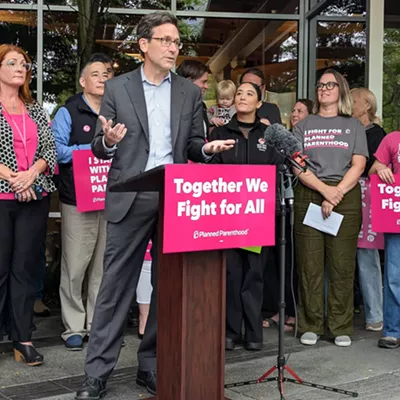
Washington had a unique opportunity to return salmon to our streams and rivers and build a model for moving forward on thorny and critical environmental issues. But Gov. Jay Inslee's opposition doomed it.
The Washington Legislature's House Agriculture and Natural Resources Committee, on a bipartisan basis, passed House Bill 1720, which would rehabilitate riparian habitat and help restore salmon runs across Washington. Riparian habitat is the land on either side of a creek, tributary or river. Abundant trees and shrubs along banks cool and filter water. Salmon need cool, clean water, but on some ranch, farm and forest lands those trees and shrubs have been cleared. Under HB 1720 local conservation districts would provide incentives for ranchers and farmers to replant stream and riverbanks and minimize livestock access to flowing water. Doing this is critical, since, as Jamestown S'Klallam Tribal Council Chairman W. Ron Allen told the committee, "Riparian zones are essential to salmon recovery."
This bill's impact could have been even greater than repopulating our creeks and rivers with salmon. This bill could have laid the foundation of a lasting, working environmental partnership between the sovereign tribes and Washington's farmers and ranchers.
That's because this bill resulted from negotiations between agriculture and sovereign tribal leaders, and was passed out of committee with both Republican and Democratic supporters. That is rare.
Previous attempts to pass riparian legislation failed for lack of trust between tribes and agriculture, and agriculture's fear of heavy-handed regulations. Earlier this year, the governor rekindled mistrust and fear when he requested riparian legislation that to some was a throwback to a bureaucracy-driven approach.
Fortunately, the chair of the House Agriculture and Natural Resources Committee, Rep. Mike Chapman, listened to those supporting and opposing the governor's bill and realized agriculture and the tribes shared many interests. Chapman, a Port Angeles Democrat, shifted the entire dynamic around riparian restoration legislation when he told the committee there would be "a bipartisan bill or no bill." His words prompted agricultural and tribal leaders to jointly develop a bill that they and both political parties could support.
After negotiating HB 1720 with agricultural leaders, such as the Washington State Farm Bureau, the Jamestown S'Klallam Tribe's Allen testified before lawmakers that salmon recovery was about "building a trusting relationship between all interest groups, whether its ag, whether its developers, the timber industry and the tribes and the state agencies that have responsibility for these affairs."
Nisqually Tribal Council Chair Willie Frank III told the legislative committee that "solving complex issues like salmon recovery and riparian issues require relationships and trust."
Trust is huge when figuring out how to restore riparian habitat on private land. Many landowners fear "riparian repair" is code for the state taking their land, and if approached through bureaucratic regulation, it can be. I know it doesn't have to be that way.
In the 1980s, Billy Frank Jr., a Nisqually tribal elder and nationally honored civil and Indian treaty rights activist, pulled agriculture, forestry and tribal leaders together behind a voluntary effort to restore the Nisqually River's riparian habitat. I met Frank in the late 1990s on a project to restore Muck Creek, his ancestral home. Over the following years, we collaborated on Nisqually preservation and Puget Sound recovery projects. Because of him, and agricultural leaders like Jim Wilcox, today the Nisqually stands as an example of how trust, relationships and collaborative efforts can preserve a watershed.
With this riparian restoration bill we had an opportunity to scale-up the pragmatic Nisqually approach Frank established.
Rep. Joel Kretz, a Wauconda Republican who cosponsored the bill, explained in an TVW interview that "both tribes and agriculture are frustrated. The tribes are frustrated that we haven't made as much progress on salmon recovery as we should have... and agriculture is nervous about being told what to do... We've tried decades of the heavy-handed regulatory approach, and I don't think it works. I think we're going to see some real innovative projects [with this approach]."
The governor, however, wanted his bill, not the bipartisan bill crafted by tribal and agricultural leaders, and he made that known. His staff argued that Olympia regulators, rather than farmers, ranchers and tribes, were better suited to riparian restoration on farm and ranchlands. He wanted to enforce a single standard across the state, even though effective salmon recovery will differ by topography, water flow, tributary, river and species. No matter. His natural resource adviser testified that Olympia regulatory agencies are "the ones most familiar with what is needed."
Chapman, the House Agriculture and Natural Resources Committee chairman, emphasized that the bipartisan bill recognized "the importance of salmon recovery efforts while also respecting... the agricultural community." HB 1720 passed out of committee, over the governor's objection, with bipartisan support. Then it was sent to budget writers where the chilling effect of Gov. Inslee's opposition caused the Capital Budget Committee to let deadlines lapse.
Rather than deferring to the governor, I wish they had listened to Jamestown S'Klallam Chair Allen who told legislators, we do not want "seven generations from now to look back at what we didn't do."
Last year, legislators voted 92-5 to place Billy Frank Jr.'s statue in the U.S. Capitol. This year, by passing this riparian restoration bill, they could have honored him not in bronze, but by continuing his work. They didn't. There is always next year, when likely, there will be fewer salmon. ♦
Bill Bryant, who served on the Seattle Port Commission from 2008-16, ran against Jay Inslee as the Republican nominee in the 2016 governor's race. He is chairman emeritus of the company BCI, is a founding board member of the Nisqually River Foundation and was appointed by Gov. Chris Gregoire to serve on the Puget Sound Partnership's Eco-Systems Board. He lives in Winthrop, Washington.






















